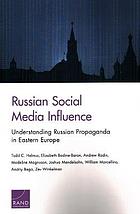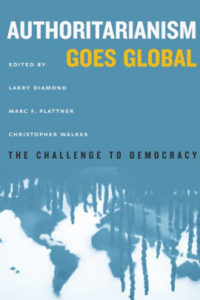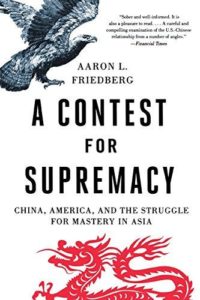Liberal democracies should prepare for “the coming ideological battle” with newly resurgent authoritarian powers, the U.S. Senate Intelligence Committee heard on Tuesday.
“China and Russia are more aligned than at any point since the mid-1950s, and the relationship is likely to strengthen in the coming year as some of their interests and threat perceptions converge, particularly regarding perceived US unilateralism and interventionism and Western promotion of democratic values and human rights,” said the annual “Worldwide Threat Assessment.”
Beijing and Moscow “will present a wide variety of economic, political, counterintelligence, military, and diplomatic challenges to the United States and its allies. We anticipate that they will collaborate to counter US objectives, taking advantage of rising doubts in some places about the liberal democratic model,” said the report, presented by Director of National Intelligence Dan Coats and other senior intelligence officials.
“Both countries probably will use the UN as a platform to emphasize sovereignty narratives that reflect their interests and redirect discussions away from human rights, democracy, and good governance,” adds the assessment, a report that “reflects the collective insights of the Intelligence Community” about the principal threats currently facing national security.
“As China and Russia seek to expand their global influence, they are eroding once well-established security norms and increasing the risk of regional conflicts, particularly in the Middle East and East Asia,” it adds. “At the same time, some US allies and partners are seeking greater independence from Washington in response to their perceptions of changing US policies on security and trade and are becoming more open to new bilateral and multilateral partnerships.”
“More broadly, US adversaries and strategic competitors almost certainly will use online influence operations to try to weaken democratic institutions, undermine US alliances and partnerships, and shape policy outcomes in the United States and elsewhere,” it states:
 Russia’s social media efforts will continue to focus on aggravating social and racial tensions, undermining trust in authorities, and criticizing perceived anti-Russia politicians. Moscow may employ additional influence toolkits—such as spreading disinformation, conducting hack-and leak operations, or manipulating data—in a more targeted fashion to influence US policy, actions, and elections.
Russia’s social media efforts will continue to focus on aggravating social and racial tensions, undermining trust in authorities, and criticizing perceived anti-Russia politicians. Moscow may employ additional influence toolkits—such as spreading disinformation, conducting hack-and leak operations, or manipulating data—in a more targeted fashion to influence US policy, actions, and elections.- Beijing already controls the information environment inside China, and it is expanding its ability to shape information and discourse relating to China abroad, especially on issues that Beijing views as core to party legitimacy, such as Taiwan, Tibet, and human rights. China will continue to use legal, political, and economic levers—such as the lure of Chinese markets —to shape the information environment. It is also capable of using cyber attacks against systems in the United States to censor or suppress viewpoints it deems politically sensitive.
- Iran, which has used social media campaigns to target audiences in both the United States and allied nations with messages aligned with Iranian interests, will continue to use online influence operations to try to advance its interests.
- Adversaries and strategic competitors probably will attempt to use deep fakes or similar machine-learning technologies to create convincing—but false—image, audio, and video files to augment influence campaigns directed against the United States and our allies and partners.
 The Coming Ideological Battle
The Coming Ideological Battle
“Chinese leaders will increasingly seek to assert China’s model of authoritarian capitalism as an alternative—and implicitly superior—development path abroad, exacerbating great-power competition that could threaten international support for democracy, human rights, and the rule of law,” the assessment asserts:
- The actions of Xi and his advisers—doubling down on authoritarianism at home and showing they are comfortable with authoritarian regimes abroad—along with China’s opaque commercial and development practices, reward compliant foreign leaders and can be corrosive to civil society and the rule of law.
- At the 2018 Central Foreign Affairs Work Conference, Xi stated his desire to lead the reform of the global governance system, driving a period of increased Chinese foreign policy activism and a Chinese worldview that links China’s domestic vision to its international vision.
 Beijing has stepped up efforts to reshape the international discourse around human rights, especially within the UN system. Beijing has sought not only to block criticism of its own system but also to erode norms, such as the notion that the international community has a legitimate role in scrutinizing other countries’ behavior on human rights (e.g., initiatives to proscribe country-specific resolutions), and to advance narrow definitions of human rights based on economic standards.
Beijing has stepped up efforts to reshape the international discourse around human rights, especially within the UN system. Beijing has sought not only to block criticism of its own system but also to erode norms, such as the notion that the international community has a legitimate role in scrutinizing other countries’ behavior on human rights (e.g., initiatives to proscribe country-specific resolutions), and to advance narrow definitions of human rights based on economic standards.
Lt. Gen. Robert P. Ashley Jr., the director of the Defense Intelligence Agency, said no Chinese company [such as Huawei] could truly choose whether to cooperate or hand over data, given Beijing’s grip, the New York Times adds.
“It is really authoritarian capitalism in the way the government provides oversight and puts very strict rules in place,” General Ashley said. “It is very problematic.”
The Democratic chair of the House Intelligence Committee Rep. Adam Schiff (D-Calif.) wrote that “it is a credit to our intelligence agencies that they continue to provide rigorous and realistic analyses of the threats we face.”
 “We expect democracy and civil liberties in many Southeast Asian countries to remain fragile and China to increase its engagement in the region to build its influence while diminishing the influence of the United States and US allies,” the assessment states. “The United States will see mounting threats in Asia, including a variety of challenges from China and North Korea, and rising authoritarianism in the region.”
“We expect democracy and civil liberties in many Southeast Asian countries to remain fragile and China to increase its engagement in the region to build its influence while diminishing the influence of the United States and US allies,” the assessment states. “The United States will see mounting threats in Asia, including a variety of challenges from China and North Korea, and rising authoritarianism in the region.”
“Several countries and regions in Sub-Saharan Africa are likely to face significant security, counterterrorism, democratization, economic, and humanitarian challenges,” it adds. “Recent political unrest in countries such as Zimbabwe and Sudan highlight the ongoing challenges facing many governments across the continent. African countries’ outreach and cooperation with external actors—such as China and Russia—will increase this year.”







